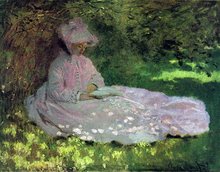Good evening, Ladies. I have read The Good Earth a couple of times, once in high school or college and once about ten years ago as part of the curriculum in my high school world studies class. I didn't re-read it this time, but I re-read my marginal notes, which were extensive. I have been particularly interested in the way literature changes with what we bring to it as individuals. My reactions ten years ago were vastly different from my reactions as a young reader and it was fun to re-read them today.
I have really enjoyed everyone's comments thus far. KT, I thought your comment on blaming the gods when things go badly but not praising them when things go well was right on. I also appreciated Laurenda's comment about O-lan leaving the fields to give birth by herself and Katrina's comment about Buck's challenges in getting the book published in the first place. I wasn't aware of this.
Having had the opportunity to teach the history of China, I find this book so true to the culture. The "Dynastic Cycle," or rise and fall of "houses" in China is very similar to the cycle of righteousness in The Book of Mormon. According to the wisdom of Confucious, a house rises to power when the gods are pleased with them. The people will know the gods are pleased when the lives of the people go well: rain in its season, plentiful crops, stable government, honorable rulers, etc. As the dynasty ages, corruption creeps in and the gods are displeased which is demonstrated by drought, instability and war. This results in the overthrow of the old dynasty and the beginning of a new one which lasts until they become corrupt and the cycle begins again. The House of Hwang and Wang Lung's family story fit the cycle well.
Wang Lung's attitude toward the land could also symbolize a person's attachment to his/her roots, values, heritage whether or not that is actual "land." It is important that we pass those values on to the next generation or they will abandon the things which should be of value in their lives, just as Wang Lung's sons did. The counsel to "remember" that is repeated again and again in the scriptures is to counter the human tendency to forget the things that made individuals, families and societies strong in the first place.
I have also been frustrated by the lack of value for women in turn-of-the century China. The destruction of the rigid social structure of Confucious was a goal of the communists. However, societal attitudes are hard to eliminate. I have still seen some "anti-girl" attitudes in my Asian students. I also have read that the one-child policy of China today has led to the modern-day infanticide of girl babies in the drive to have an male heir, especially in the smaller villages.
One other point, although the foot-binding of ancient China is hard to believe, the parents did it to ensure their daughters' future happiness. I am sure there are things we do as a society today that, while well-intentioned, are harmful to girls. "Take gymnastics and dance." "Do everything and do it well." Get "A's." "Thin is beautiful." "Beauty is valuable." "Perfect is expected." Society sends lots of messages and parents buy into them as well to help their daughters have a happy future. It can be crippling to girls and I see this in some of my students.
There is so much of value in The Good Earth. I am glad for the opportunity to discuss it. Thanks!
--Karen S.
Wednesday, April 26
Subscribe to:
Post Comments (Atom)

1 comment:
You're right. We do have customs in society today that are very harmful (and painful) to girls. Although not as physically painful as foot-binding, many of the social and emotional pressures (I think) can do more damage. Look at all the eating disorders, all of the young girls and women on prozac, etc. Nice review!!
Post a Comment